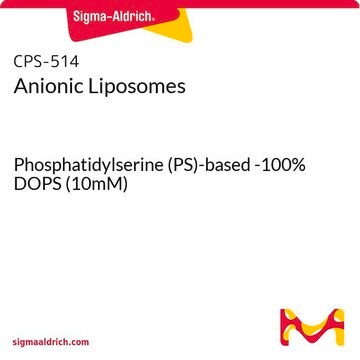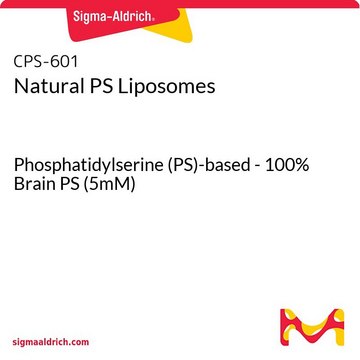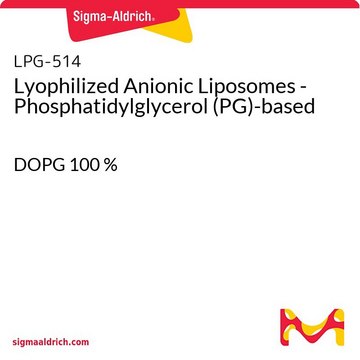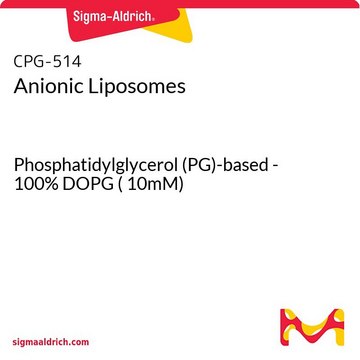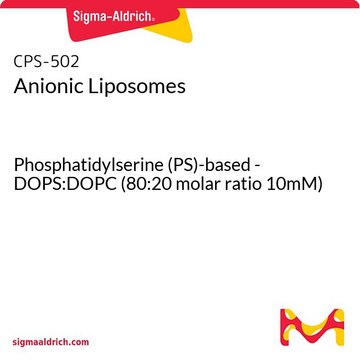推薦產品
形狀
lyophilized powder
成份
DOPS:DOPC (70:30 molar ratio)
顏色
white to off-white
平均粒徑
100 nm
尋找類似的產品? 前往 產品比較指南
一般說明
Lyophilized liposomes product series are freeze-dried liposomes with various types of lipids and wide range of zeta potentials and different properties. These products should be used by scientists who understand liposome formulation and have the proper equipment to check the size, separate non-encapsulated drugs and do the proper assays.
Liposomes are extensively used to study the interaction of proteins, peptides and other molecules with the surface of a lipid membrane. One of the parameters that affects this interaction is the charge of the liposomal membrane. Liposomes are always made in aqueous environment and they are sized to the desired size in liquid state using various methods such as high-pressure extrusion through nano sized pore track etch membranes. In rare occasions, liposomes are freeze dried and proliposomes are formed in the presence of a lyoprotectant such as trehalose. Using a lyoprotectant is necessary in order to maintain the size of the liposomes after rehydration.
Phosphatidylserine (PS) is a negatively charged molecule. The amount of the negative zeta potential in the liposomes depends on the molar percentage of the phosphatidylserine (PS) in the formulation. The matrix lipid, DOPC, that is used in the formulations does not significantly contribute to the charge of the liposomes. Anionic liposomes are used in blood complement studies and various types of in vitro studies.
Liposomes are extensively used to study the interaction of proteins, peptides and other molecules with the surface of a lipid membrane. One of the parameters that affects this interaction is the charge of the liposomal membrane. Liposomes are always made in aqueous environment and they are sized to the desired size in liquid state using various methods such as high-pressure extrusion through nano sized pore track etch membranes. In rare occasions, liposomes are freeze dried and proliposomes are formed in the presence of a lyoprotectant such as trehalose. Using a lyoprotectant is necessary in order to maintain the size of the liposomes after rehydration.
Phosphatidylserine (PS) is a negatively charged molecule. The amount of the negative zeta potential in the liposomes depends on the molar percentage of the phosphatidylserine (PS) in the formulation. The matrix lipid, DOPC, that is used in the formulations does not significantly contribute to the charge of the liposomes. Anionic liposomes are used in blood complement studies and various types of in vitro studies.
應用
- Liposomes are formed upon hydration of the lyophilized formulation. If the lyophilized liposomes are hydrated with solution containing a water-soluble drug, then a large percentage of the drug will stay outside of the liposomes and in non-encapsulated form. It is advised to use a micro dialysis cassette or a spin column using the right-side beads (depending on the size of your drug) and separate the drug encapsulated liposomes from free drug and perform the drug assay in order to calculate the encapsulation efficiency.
- Lyophilized liposomes are mainly recommended to be used with drugs that have a short life in aqueous solution mainly due to hydrolysis. After adding the solution of the drug to lyophilized liposomes, the liposomes should be used immediately.
- Lyophilized liposomes products should be used by scientists who understand liposome formulation and have the proper equipment in order to check the size, separate the non-encapsulated drug and do the proper assays.
- Trehalose is used as a lyoprotectant in all freeze-dried liposome formulation. The size distribution after hydration of the freeze-dried formulation will be around 100 nm.
- Freeze-dried liposomes should be kept at -20°C.
儲存類別代碼
13 - Non Combustible Solids
水污染物質分類(WGK)
WGK 3
閃點(°F)
Not applicable
閃點(°C)
Not applicable
我們的科學家團隊在所有研究領域都有豐富的經驗,包括生命科學、材料科學、化學合成、色譜、分析等.
聯絡技術服務
